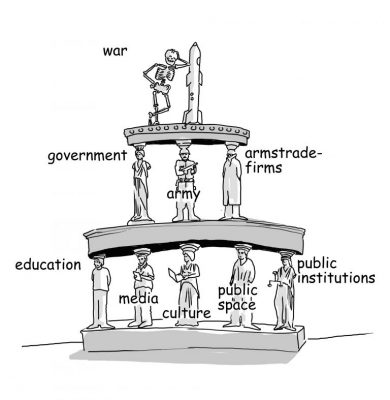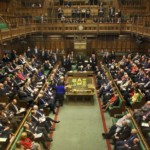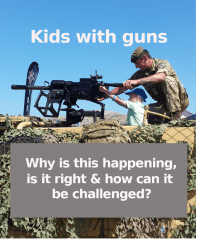Over the last 15 years, ForcesWatch has observed and responded to ways in which the military has been promoted as a normal part of everyday life. We believe that uncritical support for the armed forces stifles debate about alternatives to war and the enormous damage that is done to those involved in conflict.
In this period there have been many government initiatives – such as Armed Forces Day, promoting ‘military ethos’ in schools, the Cadet Expansion Programme and the Armed Forces Covenant – that seek to manufacture a climate of uncritical national pride in the armed forces in order to maintain recruitment levels and garner public support for defence and foreign policy. Policies promoting the interests of the armed forces are embedding the military into many of our civilian institutions.
To explore if changes in civil-military relations in recent years amount to a process of militarisation, we use the following to define militarism as:
- The normalisation of war and preparation for war.
- Prioritising the needs and interests of military institutions.
- Extension of military culture and influence into everyday life such as in education, central and local government and business, charities and other organisations.

See more on ‘What is militarism?’‘
There is much evidence to indicate that these aspects of militarism have intensified. This ‘new tide of militarisation’ can be traced through policy and practice and adds up to a concerted effort by government and the armed forces, and supported by others, to promote the military, recruitment to the armed forces, defence spending and military approaches to conflict situations.
A new era of militarist realism
In the last few years we have seen a shift towards ‘integrating‘ defense – and militaristic approaches – into wider aspects of government, and plans to make more use of the military – and special forces which have no oversight in parliament – to respond to threats ‘below the threshold of war’.
The 2021 Integrated Review of Security, Defence, Development and Foreign Policy set out a dystopian vision of a country always preparing for war, further blurring the boundaries between military and civilian, and ‘between war and peace’. It also set out a policy of defence as an industrial strategy, linking it to the future prosperity of the UK.
With the start of the Ukraine war in 2022, ‘war-footing’ narratives from senior military figures, politicians and parts of the media in the UK have become mainstream. These have escalated with the threat of the US withdrawing defence support in Europe in 2025, with the UK government announcing ‘a new era of national security’ and a corresponding emphasis on developing the defence-led economy and addressing the ‘crisis’ in military recruitment.
For the UK government, linking its support for the military industries to its wider plan for ‘growth’, provides cover for a policy of ‘military keynesianism’ that is not supported by evidence. The question of whether the UK should be looking for prosperity from an industry and mindset that fuels death, destruction, surveillance and climate breakdown, is also unlikely to be addressed.
Read more on the ‘militarist realism’ of the Strategic Defence Review and National Security Strategy of 2025.
Useful resources
Security for the future: In search of a new vision
 A group of UK peacebuilding professionals invite you to participate in a new civic conversation about alternatives to the current approach to national security. Here they outline their concerns about the existing model, and offer a different vision for the future, welcoming input from anyone who wishes to engage in this debate.
A group of UK peacebuilding professionals invite you to participate in a new civic conversation about alternatives to the current approach to national security. Here they outline their concerns about the existing model, and offer a different vision for the future, welcoming input from anyone who wishes to engage in this debate.
Presentations from the Militarisation in Everyday Life in the UK conference

















